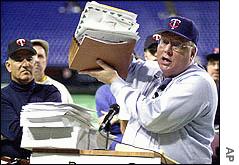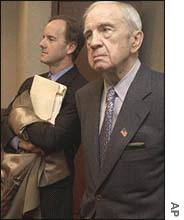|
A Twins set of books
|
 |
December 5, 2001: 2:32 p.m. ET
Contraction target Twins likely are a money maker, despite baseball's claims.
A twice-weekly column by Staff Writer Chris Isidore
|
NEW YORK (CNN/Money) - Baseball Commissioner Bud Selig says he'll open the books on baseball's finances at a congressional hearing this week and show that only five of the 30 teams in the majors made money in 2001.
When he does so he will do one of two things:
1) Reveal that the Minnesota Twins, one of the teams most often cited as being threatened with closure due to a proposed contraction to 28 teams, is one of the handful of teams that made money, or
2) Evade the truth.
Because if the Twins managed to lose money this year, it's only because they paid their scouts, minor leaguers, peanut vendors and other normally lowly paid employees more than they paid their All-Star baseball players.
This isn't based on information from the union or other critics of baseball management. It comes from the so-called "blue ribbon" panel that looked at the economics of the game for the league last year, and which also claimed to release the operating profits or losses for each team.
That panel, which had no representation from the Major League Baseball Players' Association or union economists, also portrayed a grim economic picture, with only three teams out of 30 -- the New York Yankees, the Colorado Rockies and the Cleveland Indians -- making money in the five seasons from 1995 to 1999.
The report listed the Twins as having revenue in 1999 of $52.6 million, and it is certain that revenue was quite a bit higher in 2001, conservatively as much as a third higher.

|
|
|
Paul Ridgeway, right, chairman of the Keep the Twins at Home group, holds a pile of petitions asking baseball not to close or move the team. He'd have an even stronger argument if he could be holding an honest set of the team's financial reports. | |
First of all the team, buoyed by success that had it in first place for much of the season, saw attendance of 1.8 million last year, up nearly a third over 1999.
The league just completed the first year of a six-year, $2.5 billion television deal with Fox (FOX: Research, Estimates) that increased each team's share of national money. Other league-wide money also was up.
And despite the fact that many fans assume that baseball doesn't have revenue sharing, each team does contribute 20 percent of net local revenue from things like attendance, concession and local television contracts to a general pool. Three-quarters of that money is split equally among the 30 teams, the other quarter goes to the 15 teams, like the Twins, with lower than average revenue.
With five new parks opening since 1999, overall attendance, ticket prices and other local revenue were up in 2000 and again in 2001. So it is safe to assume that the Twins' revenue sharing was sharply up as well. In fact it's likely that the Twins' revenue sharing payout topped its payroll this season, meaning that the team was covering player salaries without selling a single ticket.
But what about spiraling player salary costs? Well, the blue ribbon panel put the Twins' average payroll at $21.3 million. The team's opening day payroll this year was $24.8 million, the lowest in the league.
Of course there are costs beyond player payroll. But unlike most companies, cost of a facility isn't one of them.
The lawsuit brought by the Metropolitan Sports Facility Commission to try to keep the Twins playing next year reveals that the team pays no rent for its Metrodome home.
That suit, and other legal challenges to contraction by the players' union, make the chance of contraction taking place before 2002 roughly equal to chances of Selig testifying this week that the game is seeing record prosperity.
Instead, you can be sure that Selig will claim the economics of the game have gone from bad to worse in the last year. But it's as tough to believe baseball's claims of losses as it is to buy past congressional testimony of tobacco CEOs that they didn't believe cigarettes to be addictive.
| |

|
|
Baseball would like fans to believe that Twins owner Carl Pohlad, right, with his son Jim, managed to lose money despite paying no rent and having a player payroll less than half of their team's revenue. | |
The panel reported that the Twins had an average revenue that was double the average payroll for the five seasons it examined. Still, its report claims that the Twins lost $36.7 million, or an average of $7.3 million a year, during that period.
But even if those numbers are accurate, it's doubtful that the Twins managed to lose money this year, with revenue likely near or above $70 million, coupled with only a small increase in payroll.
Of course, it's doubtful that those numbers are accurate. No baseball team is a stand-alone public company today required to report its specific losses or profits.
Those teams that are owned by public companies, such as the Atlanta Braves, which like CNN/Money is owned by AOL Time Warner Inc. (AOL: Research, Estimates), do not have the team's financial results broken out separately.
The only team to sell public shares was the Cleveland Indians, which was public between a June 1998 initial public offering and a sale in November 1999. Its public reports, and IPO prospectus, may be part of the reason that baseball did admit to profits there the last time it claimed to be opening the books.
Click here to see CNNSI's baseball coverage
If baseball's economics are as sick as the blue ribbon panel tried to portray last year, or as Selig will try to portray this week, then I have one question: Why is former Sen. George Mitchell, one of the members of the panel, among the potential bidders to be an owner of the Boston Red Sox? 
Click here to send mail to Chris Isidore
|
|
|
|
|
 |

|

